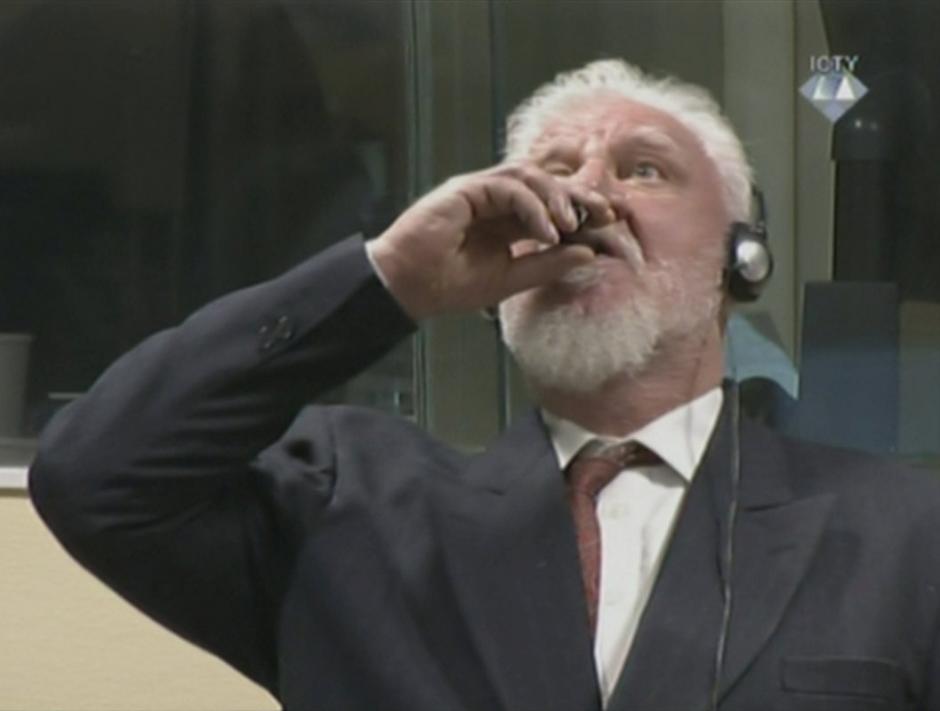Bosnian Croat war crimes convict dies after taking 'poison' in UN court

Slobodan Praljak’s apparent courtroom suicide, which was broadcast on a video feed, came in the final minutes of the last judgment at the International Criminal Tribunal for the Former Yugoslavia, which closes next month after 24 years.
The white-bearded Praljak, 72, was taken to hospital after drinking from a flask or glass as an ICTY judge read out appeals rulings against him and five other convicted Bosnian Croat war criminals, tribunal spokesman Nenad Golcevski said.
“I just drank poison,” Praljak told the stunned court. “I am not a war criminal. I oppose this conviction.” After gulping down the drink, Praljak sat back down and slumped in his chair, according to a lawyer who was in the courtroom at the time.
“Praljak drank a liquid in court and quickly fell ill,” Golcevski said. He was treated by tribunal medical staff, but “passed away today at the HMC hospital in The Hague”, he said.
Presiding Judge Carmel Agius hastily suspended the hearings and the courtroom was declared a crime scene by Dutch authorities. As a forensic investigation got under way, the chamber was sealed off and the public told to leave.
“Don’t take away the glass!” Agius said, instructing the guards to lower blinds and block a glass-partition separating the court from the public.In the chaotic moments that followed, guards and paramedics raced in and out of the courtroom, and ambulances sped away.
Croatian Prime Minister Andrej Plenkovic, whose country was the patron of Bosnian Croat nationalist forces in neighboring Bosnia’s 1992-95 war, said he regretted Praljak’s death and offered condolences to his family.
“His act tells the most about deep ethical injustice towards the six Bosnian Croats and the Croatian people.”
A reading of the judgment, which was also ruling on appeals against convictions and sentences against five other Bosnian Croat convicts, resumed more than two hours after Praljak drank the apparent poison.The incident upstaged the appeals rulings, which were important for Croatia - it suspended a session of parliament so lawmakers could follow the hearing.
“NOT A WAR CRIMINAL”
The ICTY upheld the convictions of Praljak as well as Jadranko Prlic, former political leader of the breakaway Bosnian Croat statelet during the war, along with senior Bosnian Croat military and police figures Bruno Stojic, Milivoj Petrovic, Valentin Coric and Berislav Pusic.
Judges ruled there had been a criminal conspiracy, with the involvement of the Croatian government under then-President Franjo Tudjman - who died in 1999 - aimed at the “ethnic cleansing of the Muslim population” of parts of Bosnia to ensure Croat domination there.The defendants on Wednesday received sentences ranging from 10 to 25 years. The decision cannot be appealed.
Praljak was convicted for his role in the unlawful imprisonment of 1,000 Bosnian Muslims. He was found guilty of murder and persecution and for driving Muslims from Croat-claimed territory in Bosnia.
The chairman of post-war Bosnia’s inter-ethnic presidency, Dragan Covic, a Croat, said: “(Praljak) showed before the whole world what kind of sacrifice he is ready to make to prove that he is not a war criminal.”
Previously, two defendants awaiting their ICTY trial, both Serbs, committed suicide by hanging themselves in their U.N. cells, according to court documents. Slavko Dogmanovic died in 1998 and Milan Babic was found dead in his locked cell in 2006.
The ICTY indicted 161 suspects in all from Bosnia, Croatia, Serbia, Montenegro and Kosovo in connection with atrocities in the ethnic wars there during the 1990s. Of the 83 convicted, more than 60 of them were ethnic Serbs.
The court’s lead suspect, former Yugoslav and Serbian President Slobodan Milosevic, died of a heart attack in March 2006 months before a ruling in his genocide trial.
Last week, former Bosnian Serb military commander Ratko Mladic was convicted of genocide, war crimes and crimes against humanity for mass killings of Muslims and the siege of Sarajevo and sentenced to life in prison. Mladic’s lawyers tried to delay the verdict mid-reading by saying he was too ill to continue, and Mladic was then removed from the courtroom after shouting that judges were “liars”.






